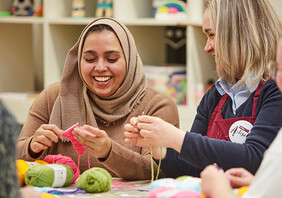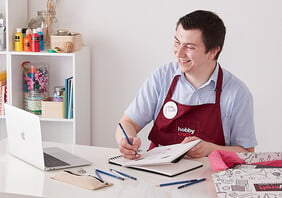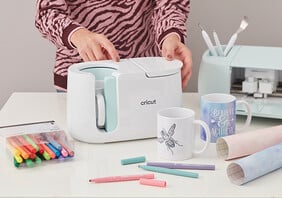Get Started In Gouache Painting
Gouache paint is a great medium to use to create fun and bold paintings.
Discover fantastic techniques for gouache painting with this beginner's guide created by expert artist and Hobbycraft Artisan, Mollie Smith.
Learn how to create beautiful gouache painting, whilst mastering how to layer colour and focus on line work and shading.
You will need
Get Started In Gouache Painting
Gouache Paint Facts:
* Gouache are water-based paints, and can be mixed with water to achieve a good consistency
* Use water to clean brushes and paint palettes
* Gouache paints are brilliant for layering, their opaque pigment means you could even paint onto black paper
* Gouache paint dries quickly, so there’s no waiting for paint to dry like oil paints.
* You can use gouache paint on a variety of surfaces, such as canvas, artistic papers, wood, ceramic and more.
* Gouache can be re-wetted, and worked over multiple times. So keep any dried gouache paint on your palette for use the next time.
Brush Guide:
There are many different tools that can be used to apply gouache paints to give you different effects. Experiment with a range of different tools to find the best that work for you.
Synthetic bristle brushes work best as they hold paint well. These smooth brushes also allow you to make the gouache paint flow nicely. Smaller brushes allow for small details, and larger brushes cover your surface quicker.

Draw out your design, we used a HB pencil to create a lighter sketch to work from. This means you can still see your pencil lines easily, and it's not too dark for your paint to go over them.

Once you have created your sketch, we are ready to begin painting!
Start with your background colour first which can be any colour of your choice! Mix several colours to achieve the desired colour, or use just one. Mix in a small amount of water to get it to a thinner consistency, but not too thin and watery that you can see through it.
Use a flat shader brush to cover a larger area, as this provides less streaky paint and covers the area quicker. Using the flat edge also gives us a nice clean line.

Whilst the background dries, we can focus on the shelf. Once again, this can be any colour you like, a darker shade is recommended however, as this produces a nice contrast to your painting.
Use a smaller round brush to apply the gouache paint, as this is a smaller area. Use a slightly lighter shade for the very front of the shelf, as this adds more depth and it will ensure your painting doesn’t appear flat.


We are ready to paint again! Mix a shade of green and don’t forget to add some drops of water to achieve the right consistency. We don’t want it to be too runny!
Using a small round brush, we can start to outline our sketch, and fill in those outlines too. Gouache is super opaque, so this means we can layer these colours nicely.

Now we’ve filled in those outlines, we can finish the other details such as the plant pot and soil.
Use a dark brown shade for the soil, and choose your preferred plant pot colour. Ensure you use a small round brush for those smaller details.

Once you have left this new paint dry, we can focus on those smaller details and thin line work. Mix a lighter green shade and use a small round brush.
Top Tip: To keep a steady hand when you are painting, keep your hand planted on the surface and try to only move your fingers, like when you’re writing with a pen.













